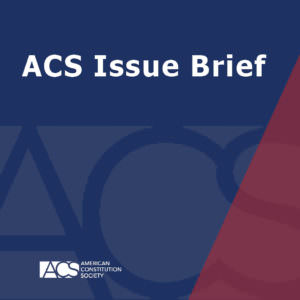The Prop 8 Court Can Have it All: Justice, Precedent, Respect for Democracy, and an Appropriately Limited Judicial Role
The Rader Family Trustee Chair in Law, USC Gould School of Law

ACS is pleased to distribute “The Prop 8 Court Can Have it All: Justice, Precedent, Respect for Democracy, and an Appropriately Limited Judicial Role,” an Issue Brief by Rebecca L. Brown, Newton Professor of Constitutional Law at the University of Southern California Gould School of Law. In this Issue Brief, Professor Brown discusses Perry v. Schwarzenegger, in which the United States District Court for the Northern District of California is considering whether the United States Constitution requires states to permit marriage between individuals of the same sex. While strong arguments may very well exist for a broad ruling, Professor Brown suggests that the case might also lend itself to a more modest resolution of the claims raised. Proposition 8 was a ballot initiative that originated as a reaction to a California Supreme Court decision interpreting California’s Constitution as requiring the state to permit same-sex couples to marry; Proposition 8 subsequently added to the California Constitution a provision that “[o]nly marriage between a man and a woman is valid or recognized in California.” After extensive analysis of case law, the author concludes that the United States Constitution’s Equal Protection jurisprudence dictates that Proposition 8 be struck down, since “[a]ny legislation must have a public purpose other than stigmatization,” and “no public purpose that could plausibly be served by this retroactive reduction in status has been offered to dispel the usual inference that any act of stigmatization is a violation of the state’s obligation to legislate impartially.”
While a decision along these lines would not touch upon the breadth of the fundamental right to marry, Professor Brown suggests that this modest resolution of Perry "would fulfill the best expectations we have of the federal judicial role, to resolve the case on strong, unassailable, time-honored, and yet narrow, grounds." As the author argues:
"A ruling of the kind I will advocate would not be an act of minimalism, but neither would it be an act of maximalism. Rather, this would be an exercise in judicial optimalism -- using good judgment to determine just how much judicial intervention is necessary to vindicate the core and essential purposes of the judicial role, without unnecessarily diverting the course of more widespread social and political movements that are at the heart of healthy and lasting legal change."
Read the full Issue Brief here: The Prop 8 Court Can Have it All: Justice, Precedent, Respect for Democracy, and an Appropriately Limited Judicial Role
